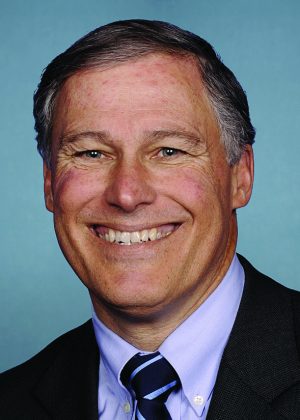Illustration by Risa Cohen
Too Hot to Handle
According to NPR/Ipsos, more than 80% of parents in the U.S. support teaching about climate change. As it becomes a leading issue, millennials and Gen Z confront climate change, begin to advocate for education and political action.
April 24, 2019

American politicians begin to address climate concerns
In the last two decades, the rate of sea level rising has grown to nearly double that of the last century. Greenland lost an average of 286 billion tons of ice per year between 1993 and 2016. The top 2,300 feet of the oceans have shown warming of more than 0.4

of the Green New Deal, which aims to transition to 100% clean energy by 2030.

degrees Fahrenheit since 1969. According to these stats from NASA, the Earth’s increase in temperature has been accelerating for decades. Yet in the political arena climate change has been largely ignored. Younger generations have made climate change a significant political issue.
According to a report from the Pew Research Center, the millenial and Gen Z generations attribute global warming to human activity more than older generations. They’re willing to take that attribution and make sure human activity stops harming the planet. Younger generations are taking their concerns to the government, demanding that climate change become a priority.
One of the most significant actions taken to address climate change is the proposal for a Green New Deal, sponsored by U.S. Rep Alexandria Ocasio-Cortez, 29, of New York. Right now, the federal government’s subsidies to big agricultural, oil, mining, nuclear, coal and timber businesses outweigh those provided to small businesses, small farmers and other environmental causes. The Green New Deal would redirect money to small businesses and small farmers who advocates say contribute to healthier, sustainable and secure communities.
The Green New Deal also addresses concerns expressed in a United Nations report, which says that unless carbon emissions are reined in over the next 12 years, the effects of climate change will be irreversible. The centerpiece of the Green New Deal is a transition to 100% clean energy by 2030, and a proposal to phase out fossil fuel use and overhaul the nation’s infrastructure.
On March 26, Senate Republicans called for an early vote on the bill without permitting discussion or expert testimony. In protest, all Democrats abstained or voted against the bill, resulting in a 57–0 defeat.
Advocating for one of her generation’s top issues, Ocasio-Cortez has called for more “environmental hardliners” in the legislature because she sees climate change as “the single biggest national security threat for the United States and the single biggest threat to worldwide industrialized civilization.”
American politicians and the public are late compared to those in other developed nations.
Teenagers across Europe have been skipping school on Fridays to protest inaction on climate change. In late January, around 30,000 students protested in Belgium. That same week, over 10,000 skipped school in Germany. These students are part of a movement that has spread globally.
Now, looking toward the 2020 presidential election, candidates are moving climate change to the forefront of their campaigns. Jay Inslee, governor of Washington, has based his entire campaign on climate change.
Inslee’s website reads, “Through Jay’s Climate Mission, America will build upon the leadership of states and local communities, and engage the full energy of our country in a 10-year mobilization to confront climate change, end our reliance on fossil fuels, and create a clean energy future.”
Inslee’s statement emphasizes that the importance of climate change as a political issue.
“This mission must be led by the White House — starting with bold action on day one of the next administration,” the website states.
Other Democratic candidates have included climate change in their policies. Cory Booker, Pete Buttigieg, Julián Castro, John Delaney, Kirsten Gillibrand, Marianne Williamson and Andrew Yang all favor a carbon tax, which charges polluting industries for the carbon dioxide they pump into the atmosphere.
Cory Booker, John Delaney, John Hickenlooper, Jay Inslee, Amy Klobuchar, Tim Ryan and Andrew Yang all favor nuclear development, which emits no carbon dioxide.
All 18 Democratic presidential candidates vowed to reenter the Paris Agreement in 2021.
Clubs bring environmental focus to Lab community
Young people around the world are taking action to raise awareness and push for solutions to climate change. At U-High, students in Green Team and the Sustainable Oceans Alliance are spearheading the effort to make environmentalism a focus.
The Green Team members work for a sustainable community and promote environmental awareness. The club’s recent focus has been on composting. Club members have rebuilt the compost bin and now take out the compost on a daily basis. Members have also participated in Artsfest and Social Justice Week.
President Nikita Kumar said she feels that what matters most to the club is community improvement.
“I think a lot of people at Lab would say they care about the environment, but for us, it’s about demonstrating that right here,” Nikita said. “A lot of the current environmental situations are upsetting, but that’s why we exist, to educate and motivate people about these issues.”
The Sustainable Oceans Alliance is a nationwide organization founded in 2015. Nikhil Patel and Kepler Boonstra formed a chapter of the organization at Lab in 2017. The organization is dedicated to protecting and conserving the ocean, with the U-High chapter having an additional focus educating people about the pollution of Lake Michigan.
Kepler said he and Nikhil wanted to form the club at Lab to make students aware of the dangers that the oceans face as well as the irresponsible use of plastic at the school. The pair also hoped that the club could help those students who wanted to protect the environment find something to do.
“I think to us, plastic pollution and global warming are the two most important, detrimental issues occurring right now,” Kepler said. “They both lead to unbalanced ecosystems and affect our lives as well.”
He added that while very person may not experience climate change in the same way, it is having a global impact.
He said, “I personally get a little annoyed when members of the community justify or say global warming doesn’t exist because ‘the temperatures were below average’ or stuff like that.”
Club meetings mainly consist of planning lake cleanups and other events.
During fall quarter, the Sustainable Oceans Alliance sold $1,311 worth of reusable straws. Members plan to host lake cleanups throughout this spring and summer as well as partner with other environmental clubs.
Kepler said that the work of groups like Sustainable Oceans Alliance is part of a larger, generational trend.
“I think generally our generation is doing a really great job with getting involved with environmentalism,” Kepler said, adding that Lab has other environmental clubs like Green Team and Wildlife Conservation Club. “I think this demonstrates that there are a lot of key people willing to make change.”
Lab’s education should focus on climate change
A whale washed ashore with 88 pounds of plastic in its stomach in March while record flooding plagued the Midwest. Wildfires burned in California, destroying 1.8 million acres and killing 85 people last year. What were previously considered “hundred-year events” are now occurring nearly every year. These extreme events demand extreme responses.
Since the effects of global climate change will be the greatest challenge for our generation, every Lab graduate should be aware of its consequences and understand the impact of their own actions.
Lab has historically been a place of innovation and creativity that prepares its graduates to tackle issues they will face in the future. Education needs to prepare students for the future — and the future is all about climate. Climate change and the health of our planet is the most pressing issue that Lab graduates will have to deal with, and as such, it deserves more attention in our curriculum across all departments. If our planet becomes uninhabitable, nothing else matters.
Teachers across the schools have begun to focus some of their courses on climate change, but we need to ensure that every student understands climate change, not just those in select classes. For example, 7th graders in their earth science classes read the the Fourth National Climate Assessment released Nov. 23 and created podcasts to discuss their interpretations while Diane Jackson’s French 4A class created and delivered presentations to 6th graders.
These efforts are a step in the right direction, yet most students graduate from Lab without receiving any consistent education on climate change. At a community-wide strategic planning retreat in January, middle school earth science teacher Tony Del Campo and I made the case for adding climate change education to the Laboratory Schools’ mission statement. By amending the mission statement, our stated promise to students, we show climate education is a top priority as we create environmental stewards and global citizens.
Additionally, we should add a graduation requirement. Like the service-learning requirement, students would be required to take a course that discusses climate change. These courses could be offered in all departments, not just science, and would dive into primary sources, allowing students to refine critical reading skills while also learning about a topic of increasing consequence.
Moreover, pushing for climate education could unite our school behind a single topic. We need something to unite teachers, administrators, students and families. We need to pick a destination and focus our energy on making sure we do everything in our power to get there, and climate change is the perfect target. If we act now, we can help ensure today’s lower school student grow up to be responsible environmental stewards who can finally solve the problems created by generations of neglect.
